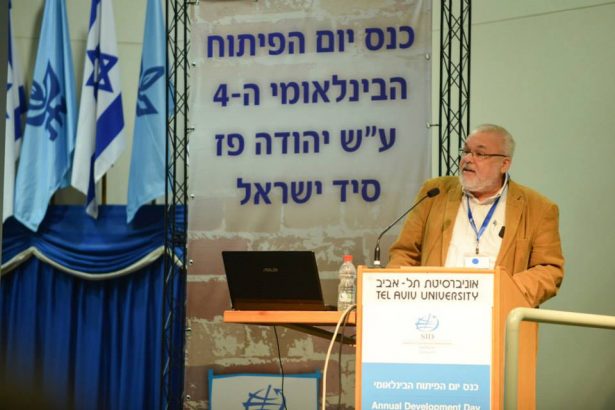The proposal to make it easier to pass the death sentence is a troubling exercise in unsustainable moral thinking, argues Edward Rettig of Rabbis for Human Rights. As a legal expression of fundamental values, the proposal should be aired in public discussion rather than being decided in the proverbial smoke-filled rooms of coalition negotiations. And, adds Rettig, that discussion will benefit from reflection on the Talmud where we find clear thinking that can be a model for our generation.
It will be slightly easier to impose a death sentence on convicted terrorists if the new Israeli coalition enacts a proposal agreed between the Likud Party and the Israel Beiteinu party. Previous instructions allowed death sentences only when the three-judge panel agreed unanimously, but the proposed new rules will allow a simple majority of two to one. La Rouchefoucault said that ‘hypocrisy is the homage vice pays to virtue’. As if recognising the inappropriateness of the proposal, the coalition agreement deals with it almost in stealth. It appears unlabelled, without using the words ‘death penalty’. The section appears in a chapter titled ‘Miscellany’ and merely notes that ‘in section 165A of the Defence Orders (integrated formulation) (no. 1651) 5770-2009, the words “sentencing will be unanimous” will be erased’.
Usually, changes at this level of regulations reflect dull administrative and procedural needs. They deal with the kind of day to day expediting of business that is not appropriate to full-scale legislation. It remains unclear whether the change will initiate any death sentences. Historically, military prosecutors do not seek death penalties, even in appalling cases of terror-murder, of which there have been many. Where prosecutors do not ask it, courts do not sentence. So the change may remain more in theory than practice. But the change in sentencing procedure is a troubling exercise in unsustainable moral thinking. It would be the kind of legal expression of fundamental values that a democracy should not settle in the proverbial smoke-filled rooms of coalition negotiations. It requires wide public discussion and debate.
The new rules apply only to the military courts, which may create a discriminatory situation. According to a leak that appeared in some Israeli newspapers and gained ugly publicity for Israel overseas, a source from the Likud party said that confining the modification to the military courts would mean it only applies to Palestinian terrorists who are not Israeli citizens. Israel generally brings its citizens to trial in Israeli courts under native Israeli law that does not allow the death penalty, so Israeli terrorists (fewer in numbers and most of them Jewish) would not face death if convicted. The allegation of discrimination is somewhat inaccurate. Israeli military courts handle Israeli soldiers charged with crimes. Such a court is hearing the case of the Israeli Jewish soldier accused of shooting a neutralised knife-attacker. Still, the leak was close enough to the truth to raise questions.
In a coalition where religious parties fill such an important role, we might expect a more serious examination of the values at work. Jewish thought engaged in a discussion of the death penalty two millennia ago, with much greater moral clarity than the Likud and Israel Beitenu parties. Expressed in the brilliant ‘telegram’ style of the Talmud, the heart of the debate is summed up:
A Sanhedrin that would execute a person once in seven years is called ‘destructive.’ Rabbi Elazar Ben Azariah says: ‘Once in seventy years.’ Rabbi Tarfon and Rabbi Akiva said: ‘If we were on the Sanhedrin, nobody would have ever been executed.’ Rabban Shimon Ben Gamliel said: ‘They would have caused increased bloodshed in Israel.’
Analysing the text, we see that it states the general rule without attribution to a particular rabbi. Afterward, we read the headlines of the debate. The general rule, accepted by consensus, is that execution should be rare, not even once in seven years. Elazar Ben Azariah wants executions to be even rarer, not once in seventy. Rabbi Tarfon and Rabbi Akiva want the death penalty to be inoperative. Only Rabban Shimon Ben Gamliel supports the death penalty with the argument that it deters bloodshed.
The rabbis cited were ‘all stars,’ some of the most important rabbis in Jewish history. They found themselves caught between the text of the Hebrew Bible that has numerous examples of the death penalty and their moral judgment regarding its unworkability. Ultimately, the debate between Shimon Ben Gamliel and the majority relates to a weighing of the inherent flaws in any legal process. While God is perfect in all judgments, by definition we humans are not. Therefore, there is a level of error built into the system. In the case of the death penalty, the results are irreversible. We may waste innocent human life, not because we are evil but because we are human. The Jewish legal tradition recognised the difficulty and built a wall of evidentiary rules around the trial of death-penalty cases that made the sentence almost impossible. However, as Shimon Ben Gamliel pointed out, there is an intuitive and essentially utilitarian concern that removing the deterrence of the death penalty would have the perverse effect of causing more, rather than less bloodshed. A year ago Avigdor Lieberman virtually restated the argument raised by Rabbi Shimon Ben Gamliel and rejected by the rabbinical consensus. Lieberman pronounced that ‘The first law we will propose in the next Knesset will be the death penalty for terrorists. We must not give them hope … otherwise, we invite more terror and yet more terror.’
In our day, much research has gone into the question of the utility of the death penalty. While there is some research that shows that it may deter certain kinds of violent crime, the moral and fiscal costs are high. For these public policy reasons, and following the general rule from the Talmud, Rabbis for Human Rights opposes the death penalty. But the case is even stronger regarding religious-nationalistic-based violence like that of Palestinian terrorists. Among Israeli security experts there is a consensus that where perpetrators know they may die committing their crime, death sentences have little deterrent value. Given the Palestinian culture that exalts ‘martyrdom,’ the death sentence may even be a perverse incentive to commit acts of terror. Rabbi Shimon Ben Gamliel spoke intuitively from the heart. But his colleagues had a better understanding of the public policy downside to state executions.
Faced with the possibility of becoming defence minister, Lieberman evidently gave up his pretension that the death penalty for terrorists would be his first bill presented to the Knesset. The Likud negotiators appear to have tossed him what they thought would be an insignificant fig leaf to cover himself. However, this section of the coalition agreement manages to be both anti-democratic in denying public debate over a hugely important public value and, because of the appearance of discrimination, it maximises the harm done to Israel’s good name both at home and overseas.
We can only hope that someone, perhaps the prime minister, will grasp what a bad idea this is. The rabbis of the Talmud over-ruled their colleague Rabbi Shimon Ben-Gamliel. Their clear thinking should be a model for our generation when we contemplate the issues involved in applying the death penalty to the challenges of our defence against terror.




































